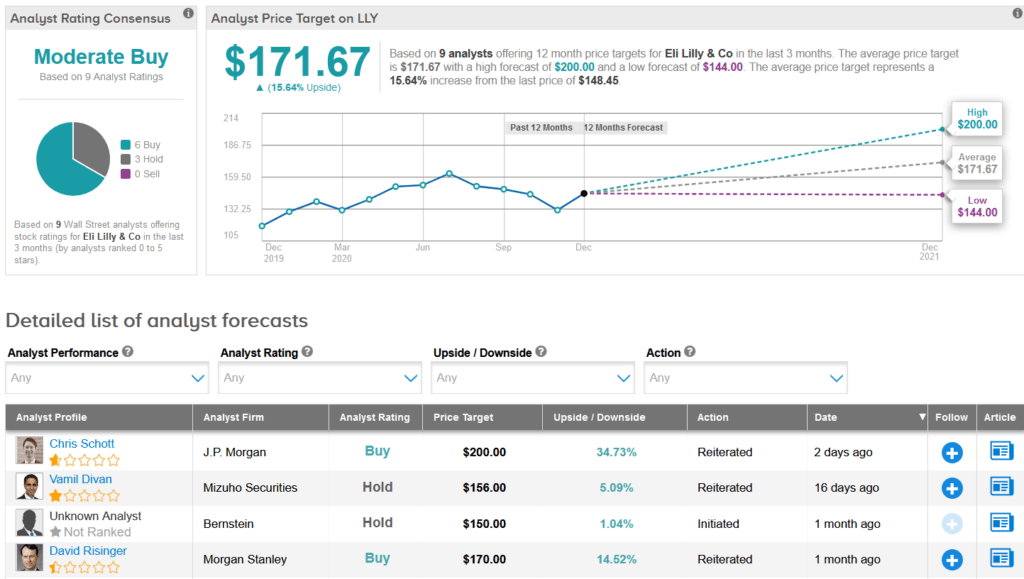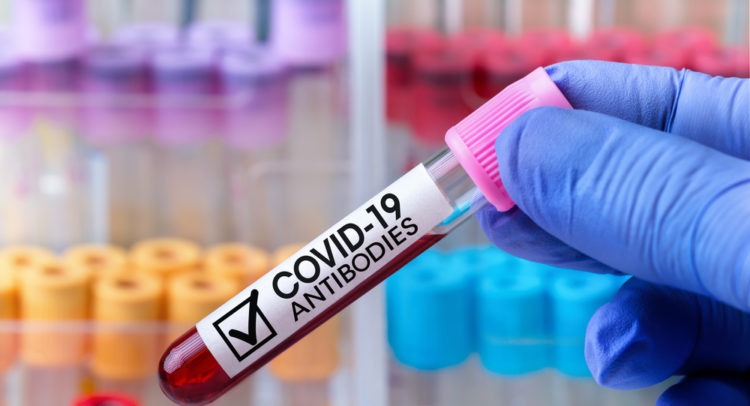Eli Lilly & Co. and insurer UnitedHealth Group have teamed up to conduct a pragmatic study of the US drugmaker’s investigational antibody treatment, bamlanivimab, in high-risk, COVID-19 infected individuals. Shares rose 3% on Dec. 4.
Lilly’s (LLY) said that as part of the partnership, the study seeks to identify and treat a large, diverse population of high-risk individuals for COVID-19 with bamlanivimab under real-world conditions with a goal of reducing the severity of illness and hospitalizations. Bamlanivimab was last month granted Emergency Use Authorization (EUA) by the US Food and Drug Administration (FDA) for the treatment of mild to moderate COVID-19 patients who are at high risk for progressing to severe illness and/or hospitalization.
In practice, the study will draw from members of both UnitedHealth’s (UNH) UnitedHealthcare health benefits business as well as its Optum health services business to detect and treat high-risk symptomatic patients who test positive for COVID-19. It will include daily symptom tracking, in-home SARS-CoV-2 testing and in-home infusion bamlanivimab services to allow patients to stay home-quarantined to minimize the potential spread of COVID-19.
Bamlanivimab is a potent, neutralizing IgG1 monoclonal antibody (mAb) directed against the spike protein of SARS-CoV-2. It is designed to block viral attachment and entry into human cells, thus neutralizing the virus, potentially preventing and treating COVID-19.
“While bamlanivimab is authorized for emergency use based on the efficacy and safety data accumulated to date, larger pragmatic studies in diverse populations can help us further understand the efficacy and safety of SARS-CoV-2 neutralizing antibodies in real world settings,” said Lilly’s chief scientific officer Daniel Skovronsky. “Lilly is excited to partner with UnitedHealth Group to study our antibody therapy using a care delivery model that will allow rapid diagnosis and in-home treatment of patients at a high risk of complications.”
The study will enroll up to 500,000 participants, with at least 5,000 expected to receive bamlanivimab therapy. To enroll participants, UnitedHealthcare Medicare Advantage members who meet the FDA-authorized criteria for treatment, will be invited to volunteer for the study.
Lilly targets manufacturing of up to 1 million doses of bamlanivimab 700 mg by the end of 2020 for use around the world. The supply of Lilly’s antibody therapy is expected to increase substantially beginning in Q1 2021, as additional manufacturing resources come online throughout the year via its five production sites worldwide, the drugmaker recently said.
Shares of LLY have advanced 13% this year and Wall Street analysts have a cautiously optimistic Moderate Buy consensus on the stock. That’s with an average analyst price target of $171.67, indicating 16% upside potential lies ahead over the coming year.
Ahead of Lilly’s 2021 financial guidance release on Dec. 15, Mizuho analyst Vamil Divan reiterated a Hold rating on the stock with a $156 price target. Vamil estimates that the company’s COVID-19 therapeutic antibody program will generate about $780 million in revenues in 2021.
“Eli Lilly continues to be viewed as a best-in-class story in large cap biopharma, with a relatively diverse new product growth story, limited patent expiry risk over the next decade, and opportunity for further margin expansion,” Divan wrote in a note to investors. “However, the stock trades at a healthy premium to its peers, and management needs to continue to execute properly to maintain that premium.” (See Eli Lilly’s stock analysis on TipRanks).

Related News:
Eli Lilly Inks $812.5M Covid-19 Antibody Supply Deal With US; Street Sees 18% Upside
Merck Cashes In On Moderna Equity Investment As Stock Pops 631% YTD
AdaptHealth Snaps Up AeroCare In $2B Deal; Shares Pop 19%
















